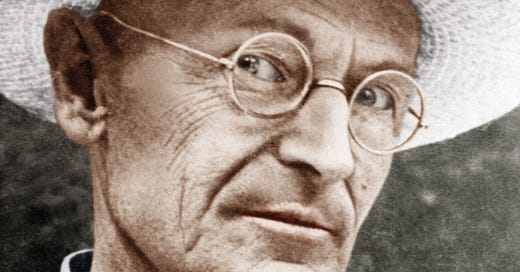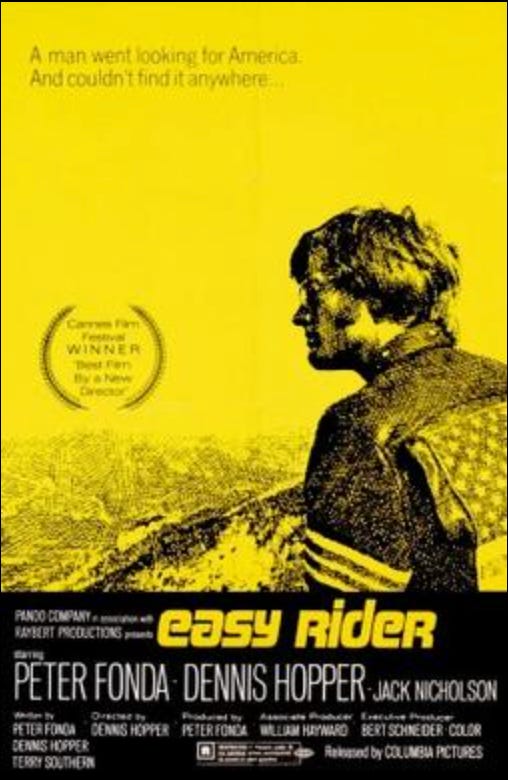Welcome aboard The Bus!
The Stop
Hermann Hesse (1877-1962), was a German/Swiss novelist and poet who won the 1946 Nobel Prize for Literature. The son and grandson of missionaries, the young Hesse was influenced by both the ‘narrower views of Protestantism’ and the ‘wider scope’ of Eastern religions and philosophies. His childhood home was visited by countless ‘foreigners, ranging from Buddhists to Americans’ who expanded his mind, and he was given full access to his grandfather’s extensive library which included many books about Eastern thought. A precocious child, he began writing at a young age and from the beginning considered all of his writing to be ‘religious in nature, not in the orthodox sense, but in a larger, universal way.’1
The primary theme of Hesse’s work concerns the efforts of individuals to ‘break out of the established modes of civilisation’ in order to discover within themselves an ‘essential spirit and identity.’ From early on, his father had decided Hesse would study theology and sent him to Maulbronn seminary at the age of 13. Though a bright student who showed academic promise, Hesse strongly disliked school - especially the ‘rigidity and the stifling of creativity of the German educational system of his time’ - and not long after arriving decided he was going to be a poet. Running away from the school, he soon became so depressed that he considered suicide and purchased a pistol. His parents intervened and subjected him to various ‘remedies for his rebelliousness.’ Ranging from sending him to a ‘school for the disturbed’ to an ‘attempt at exorcism,’ these remedies had little effect at stilling his mind until Hesse - following a brief apprenticeship in a clock factory - became a book seller’s apprentice in Tübingen.
Throughout this time Hesse was writing, and after a few minor works achieved success with the publication of Peter Camenzind (1904). A popular book written in the style of the German Romanticists, the novel’s subject - the ‘inward and outward search’ of a ‘failed and dissipated writer’- would inform his next two works, Gertrud (1910) and Rosshalde (1914). With the outbreak of World War I, Hesse moved to Switzerland from where he wrote ‘denunciations of militarism and nationalism, and edited a journal for German war prisoners and internees.’ A visit to India inspired Siddhartha (1922), a poetic novel about the search for Enlightenment set at the time of the Buddha. In 1923 he became a Swiss citizen.
A series of deepening personal crises led Hesse to investigate and undertake Jungian psychoanalysis, the influence of which appears in the novel Demian (1919). From this point, his work began to reflect his interest in the Jungian concepts of introversion and extraversion, the collective unconsciousness, idealism, archetypes and symbols. He also became ‘preoccupied with what he saw as the duality of human nature,’ a concern which directly influenced the novels Steppenwolf (1927) and Narcissus and Goldmund (1930).2 His last and longest novel was The Glass Bead Game (1943).3 Set in the 23rd century, the novel takes the form of a biography of an extraordinarily gifted intellectual who explores the ‘dualism of the contemplative and the active life.’
In his Nobel acceptance speech, Hesse acknowledged the influence of many Western philosophers, including Plato, Spinoza, Schopenhauer, and Nietzsche. However, he stressed that none of these influenced his thought as much as Indian and Chinese philosophy. For years - with the exception of a brief uptick in popularity immediately following his Nobel Prize - Hesse’s popularity was confined to a ‘handful of individuals on college campuses.’ He doubted he would ever become popular in the English-speaking world, but in the mid-60s a revived interest in his works made him into a cult hero. Ironically, Siddhartha - his most popular novel that is still taught in high schools and universities - is one of literature’s ‘greatest criticisms of formal education,’ which inevitably explains its appeal to readers today.
The Detour
Today’s Detour is England 1918 from Vivid History. Produced by a production company dedicated to ‘restoring old black and white footage and creating high-quality colourised versions,’ this video (9:03) is made from original footage was taken by US army officials of American soldiers interacting with people of the UK at the time. Painstakingly restored and colourised, with ambient sounds added to enhance the experience, the result is a fascinating - and very successful - attempt to bring alive a slice of life from over 100 years ago. Worth a watch.
The Recommendation
Today’s Recommendation is Easy Rider (1969). Directed by Dennis Hopper from a screenplay co-written by Hopper, Peter Fonda and Terry Southern,4 the film stars Hopper, Fonda and Jack Nicholson. The story of a ‘man who went looking for America and couldn’t find it anywhere,’ the film explores the rise of the hippie movement with respect to its collision with the social/cultural landscape of late-1960s America. A landmark counterculture film which helped inaugurate the New Hollywood style of early 1970s filmmaking, Easy Rider has remained a cult favourite since its release, and was recognised in 1998 by the US Library of Congress as being ‘culturally, historically, or aesthetically significant.’
Easy Rider streams on various platforms.
The Sounds
Today’s playlist is a collection of five of my favourite Steppenwolf tracks. Taking their name from Hesse’s novel, the band was prominent from 1968 to 1972. As in any Steppenwolf playlist the first track is obligatory, but in its defence it easily holds its own amongst the others: ‘Born to be Wild’ (Steppenwolf, 1968), ‘Rock Me’ (At Your Birthday Party, 1969), ‘Magic Carpet Ride’ (The Second, 1968), ‘The Pusher’ (Steppenwolf, 1968)5 and ‘It’s Never Too Late’ (At Your Birthday Party, 1969). Turn up the volume and enjoy!
The Thought
Today’s Thought is from Hermann Hesse’s first novel, Peter Camenzind (1904):
‘Oh, love isn’t there to make us happy. I believe it exists to show us how much we can endure.’
If you have a thought on this Thought - or any part of today’s issue - please leave a comment below:
And that’s the end of this Stop - I hope you enjoyed the diversion!
Thanks to everyone who subscribes - your interest and support is truly appreciated. If you like The Bus, please SHARE it with a friend or two.
If you haven’t climbed aboard The Bus, please do!
If you like The Bus, why not check out other newsletters?
The Sample sends out articles from blogs and newsletters across the web that match your interests. If you like one, you can subscribe with one click.
Refind picks five links from around the web that make you smarter, tailored to your interests. Refind is a must-read newsletter loved by over 200,000 curious minds. There’s also a very cool app. Sign up for free!
Until the next Stop …
Siddhartha (1922) is one of my favourite books by Hesse - and one I’ve always enjoyed teaching. In fact, Siddhartha is the recommendation for The Bus 2.3 (The Four Sights (Basic Buddhism Part II)). Sources for today’s Stop include Hermann Hesse (Britannica), Hesse (Nobel Prize) and Hermann Hesse (Cliffs Notes Biography).
Steppenwolf explores a middle-aged man’s conflict between expected ‘bourgeois acceptance and spiritual self-realisation,’ while Narcissus and Goldman contrasts the lives of two childhood friends who go separate ways as one remains content with ‘established religious faith’ while the other becomes an ‘artistic sensualist’ who chases his own version of salvation.
An eye disease and - in his words - the ‘increasing sicknesses of old age’ - prevented Hesse from writing any further major works, though he produced letters, essays and some stories. Hesse died in ‘seclusion of a cerebral haemorrhage’ in 1962.
Southern (1924-1995), was an American author of satirical novels and screenplays including Dr Strangelove (1964), The Cincinnati Kid (1966) and Barbarella (1968). For more information, see: Terry Southern.
Steppenwolf’s ‘The Pusher’ - used on the Easy Rider soundtrack - is a cover of the song by Hoyt Axton, who is scheduled to be a future Bus Stop. It’s a good cover, but for my money the best version is by Blind Melon on their album, Nico (1996).







Nice one Bryan. I have owned a copy of The Glass Bead Game for over ten years and never read it. I believe its time to dust that one off.
The thought comes from Peter Camenzind, but it seems like the theme of Gertrud. I loved Hesse’s books, Especially Siddhartha, Beneath the Wheel, and Journey to the East.
Are you familiar with the movie “Zachariah,” the rock music comedy western based on Siddhartha, written by the Firesign Theater? Highly recommend!